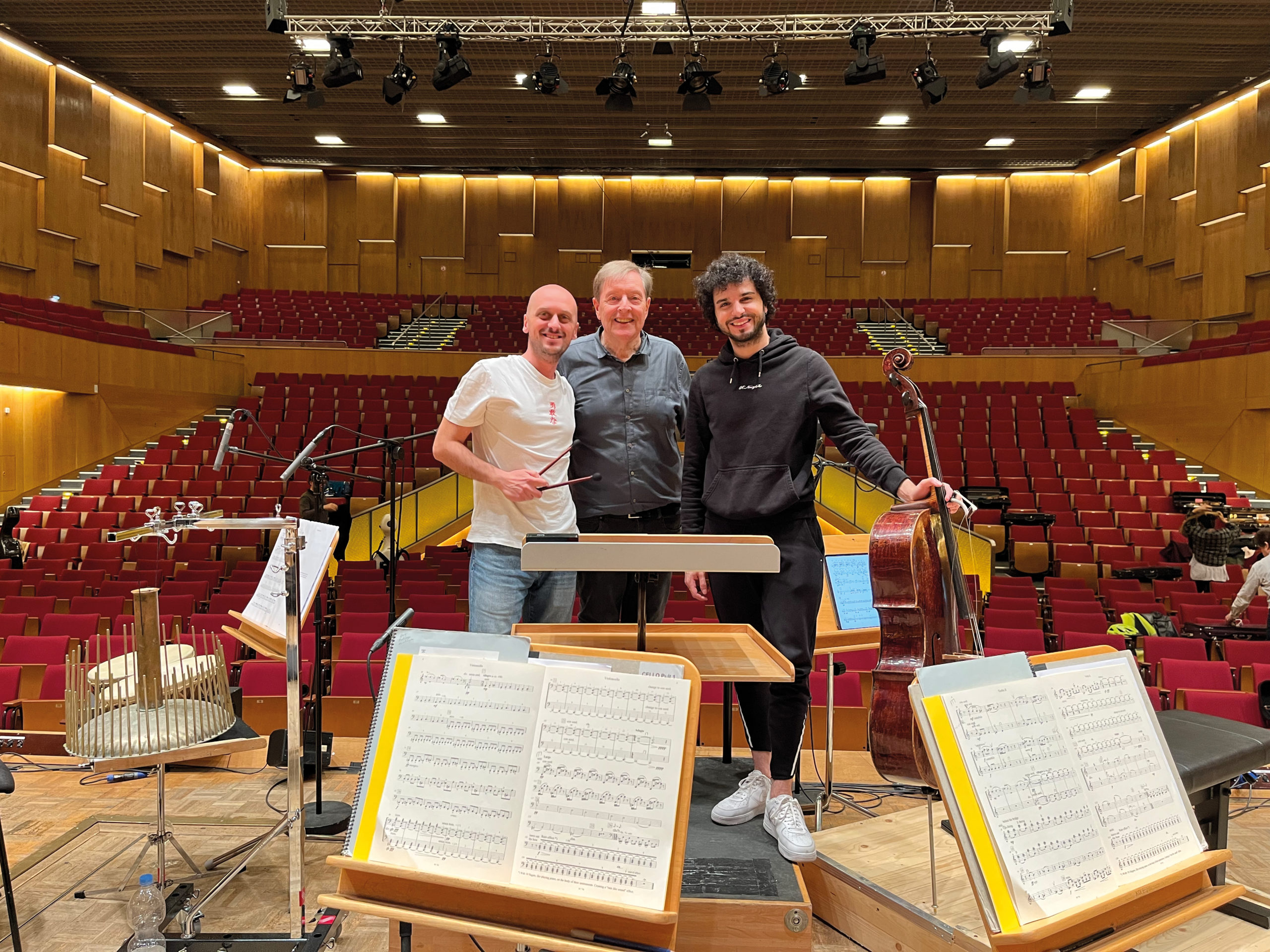Turkish Flavours – 100 Years of Turkish Symphonic Music · Howard Griffiths
Turkish Flavours – 100 Years of Turkish Symphonic Music · Howard Griffiths

About New Album
Fragt man hierzulande Klassik-Kenner nach Musik von türkischen Komponisten, dann mag wohl der Name Fazıl Say fallen – aber darüber hinaus herrscht Ratlosigkeit! Dabei hat sich, so der britische Dirigent Howard Griffiths, in den 100 Jahren des Bestehens der türkischen Republik sehr viel getan: 1936 wurde auf Anregung von Mustafa Kemal Atatürk das Konservatorium von Ankara gegründet; Musikstudent:innen wurden zur Ausbildung nach Europa und in die USA geschickt. Beginnend mit den „türkischen Fünf“, der Pioniergeneration klassischer türkischer Komponisten, konnte sich eine eigenständige klassische Musiktradition entwickeln, eine reiche und lebendige Musiklandschaft ist in der Türkei entstanden. Heute gibt es sechs Opernhäuser und zahlreiche Sinfonieorchester in der Türkei, und eine junge Generation von Interpret:innen und Komponist:innen ist nachgerückt, in deren Musik sich klassische und traditionell türkische Musik auf kraftvolle Weise zu originellen Werken verbinden.
„Ich sende euch aus als Funken und will, dass ihr als Vulkan zurückkehrt!“ Mit diesen Worten soll der türkische Staatsgründer Kemal Atatürk junge Studierende nach Europa und in die USA geschickt haben – darunter auch viele Musiker:innen. Der Vulkan, so schreibt der Dirigent Howard Griffiths, den eine enge Beziehung mit der Türkei und ihrer Kultur verbindet, im Geleitwort des Albums Turkish Flavours: Dieser Vulkan sei entstanden und sein Feuer brenne immer weiter. Auf dem Doppelalbum, das anlässlich des 100-jährigen Bestehens der modernen Türkei entstand, gibt er am Pult des Deutschen Symphonie-Orchesters Berlin einen Einblick in das vielfältige und reiche sinfonische Schaffen türkischer Komponist:innen.
Während die erste CD des Doppel-Albums der ersten (bzw. zweiten) Generation von Komponisten klassischer Musik in der Türkei, den sogenannten „Türkischen Fünf“, gewidmet ist, sind auf der zweiten CD Werke der jüngeren Komponist:innengeneration zu hören.
Die Komponisten der „Türkischen Fünf“ studierten in Europa und verbanden in unterschiedlicher Weise westliche Sinfonik mit der traditionellen Musik der Türkei – wie Cemal Reşit Rey (1904–1985), der bei Gabriel Fauré Kompositionsunterricht nahm und in überaus farbenreichen „Schnappschüssen“ ein vibrirend-lebendiges Bild der Bosporus-Metropole skizziert, oder Ulvi Cemal Erkin (1906–1972), der bei Nadia Boulanger studierte und in seinem Sinfonischen Satz türkische Makams, traditionelle Volksmelodien, komplexe Rhythmen mit dem vollen Klang des Sinfonieorchesters kombiniert, oder Necil Kâzım Akses (1908–1999), in dessen Poème sich die Liebe zur türkischen Dichtung niederschlägt.
Die Komponist:innen der heutigen Generation, die u.a. in Deutschland, Frankreich oder in den USA studiert haben, schauen zurück auf ihre eigenen Wurzeln – mit den Augen der westlichen Musik: sei es der am Berklee College of Music ausgebildete Onur Türkmen (*1972), dessen Musik von vielen Ensembles auf Festivals in Europa und den USA aufgeführt wird, sei es der wohl international bekannteste türkische Pianist und Komponist Fazıl Say, der in Şahmeran die alte anatolische Legende vom tragischen Schicksal der Königin Şahmeran in einer schillernden Stimmungslandschaft lebendig werden lässt, oder sei das rebellische, intensive Streichquartet „hırçın“– widerspenstig (2015) der mehrfach in Deutschland und der Türkei ausgezeichneten jungen Komponistin Sinem Altan (*1985): Sie alle verbinden in individueller Weise westlich-klassische Tradition mit dem Erbe ihrer Kultur.
Und so können wir uns nur dem Wunsch von Howard Griffiths anschließen, dass dieses Album zur Anregung dienen möge, „mehr von diesem wenig bekannten Schatz der türkischen Musik zu entdecken“.
***
If you ask classical music connoisseurs in this country about music by Turkish composers, the name Fazıl Say is likely to come to mind – but beyond that, there’s no idea! According to the British conductor Howard Griffiths, a lot has happened in the 100 years of the Turkish Republic’s existence: the Ankara Conservatory was founded in 1936 at the suggestion of Mustafa Kemal Atatürk; music students were sent to Europe and the USA for training. Starting with the ‘Turkish Five’, the pioneering generation of classical Turkish composers, an independent classical music tradition was able to develop, and a rich and lively musical landscape has emerged in Turkey. Today, there are six opera houses and numerous symphony orchestras in Turkey, and a young generation of performers and composers has emerged whose music powerfully combines classical and traditional Turkish music to create original works.
‘I send you out as sparks and want you to return as volcanoes!’ With these words, the Turkish state founder Kemal Atatürk is said to have sent young students to Europe and the USA – including many musicians. The volcano, writes conductor Howard Griffiths, who has a close relationship with Turkey and its culture, in the foreword to the album Turkish Flavours: this volcano was created and its fire continues to burn. On the double album, which was produced to mark the 100th anniversary of modern Turkey, he gives an insight into the diverse and rich symphonic oeuvre of Turkish composers on the podium of the Deutsches Symphonie-Orchester Berlin.
While the first CD of the double album is dedicated to the first (or second) generation of composers of classical music in Turkey, the so-called ‘Turkish Five’, the second CD features works by the younger generation of composers.
The composers of the ‘Turkish Five’ studied in Europe and combined Western symphonic music with the traditional music of Turkey in different ways – such as Cemal Reşit Rey (1904-1985), who took composition lessons from Gabriel Fauré and sketches a vibrant and lively picture of the Bosphorus metropolis in extremely colourful ‘snapshots’, or Ulvi Cemal Erkin (1906-1972), who studied with Nadia Boulanger and combines Turkish makams, traditional folk melodies and complex rhythms with the full sound of the symphony orchestra in his symphonic movement, or Necil Kâzım Akses (1908-1999), whose Poème reflects his love of Turkish poetry.
The composers of today’s generation, who have worked who have studied in Germany, France or the USA, look back at their own roots – through the eyes of Western music: be it the Berklee College of Music-trained Onur Türkmen (*1972), whose music is performed by many ensembles at festivals in Europe and the USA, be it the probably internationally best-known Turkish pianist and composer Fazıl Say, who in Şahmeran brings the old Anatolian legend of the tragic fate of Queen Şahmeran to life in a dazzling atmospheric landscape, or the rebellious, intense string quartet ‘hırçın’- widerspenstig (2015) by the young composer Sinem Altan (*1985), who has won several awards in Germany and Turkey: They all combine Western classical tradition with the heritage of their culture in their own individual way.
And so we can only agree with Howard Griffiths› wish that this album should serve as an inspiration to “discover more of this little-known treasure of Turkish music”.















